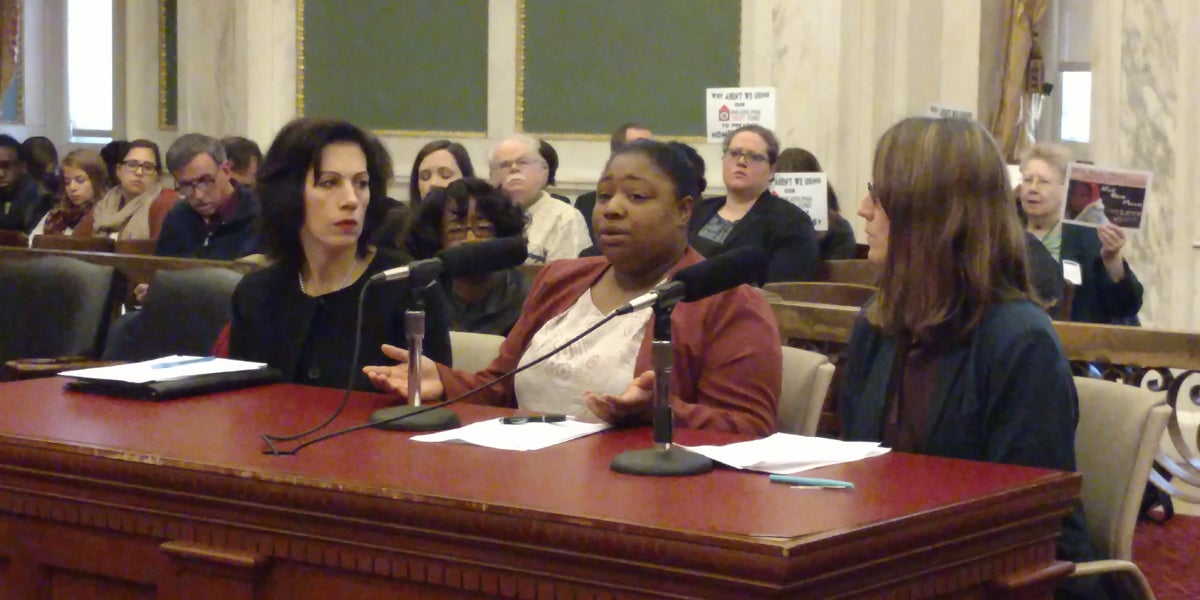Advocates for homeless seek Philadelphia rent-assistance funding to reduce need for shelters

Nifia Medley (center) spoke Monday before Philadelphia City Council. She has been living in a homeless shelter with her 8-year-old daughter for 14 months. (Katie Colaneri/WHYY)
How much would it cost to stop homelessness before it starts in Philadelphia?
A group of advocates for homeless families say $3 million would be a start.
The Family Service Provider Network said Philadelphia’s shelter system is log jammed. Many families are turned away because there are no beds available, while many others can’t find an affordable place to live so they can leave the system.
“Shelter is not the solution, we’re not asking for more shelters,” said Rachel Falkove, executive director of the Philadelphia Interfaith Hospitality Network.
Falkove was one of more than a dozen people who spoke at a City Council hearing Monday about the shelter crisis.
“In 2002 the average length of stay, at least in our program, was somewhere around two months,” she said. “Now we feel very, very lucky if we can get a family out in 10 months and that’s jumping through hoops and doing really creative things.”
Nifia Medley and her 8-year-old daughter have been living in a shelter run by Episcopal Community Services for 14 months. After Medley sacrificed her full-time job to take care of a sick aunt, they began crashing with other family members. Eventually, she said, they ran out of options and were forced to seek shelter.
“Mentally, physically, it takes a toll on you,” Medley said. “I’ve been there almost 15 months — I’m still here.”
The Family Service Provider Network is lobbying City Council members for $3 million to put toward programs that prevent people like Medley from ever needing to enter the shelter system in the first place. Falkove said that amount would house 750 families at a cost of $4,000 each.
Advocates said that money could be put toward rental assistance programs that help people stay in their homes. For example, PINH’s “master lease” program offers residents a chance to increase their rent payments over time until they become self-sufficient. In the meantime, PINH holds the resident’s lease.
Another model the network is pushing comes out of New York City.
The Homebase program provides a variety of services to keep people in their homes from short-term financial assistance to mediating disputes with landlords.
“We keep it simple — see the ball, hit the ball,” said Dan Farrell, an executive at the nonprofit HELP USA, which operates the program. “[If] someone has an option, do everything you can to keep them from losing that option.”
Farrell said it’s kept nearly 600 families in New York City from becoming homeless.
Liz Hersh, director of Philadelphia’s Office of Homeless Services, said the city is interested in piloting Homebase, as well as a master lease program in Philadelphia, provided the funding is available.
“We’re trying to build out so more people can stay where they are or find their own place and save the shelter beds for people who really have absolutely nothing and nowhere to go,” Hersh said.
Mayor Jim Kenney has already allocated an extra $1 million for homeless services programs in his current budget proposal. The Family Service Provider Network’s $3 million ask for prevention efforts would require council members to push for more during the budget process.
In the meantime, Marsha Cohen with the Homeless Advocacy project stressed the need to take immediate action.
“Right now, we have more families than ever who cannot access shelter …,” Cohen said. “We can’t go on like this.”
WHYY is your source for fact-based, in-depth journalism and information. As a nonprofit organization, we rely on financial support from readers like you. Please give today.




